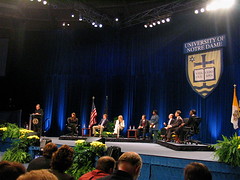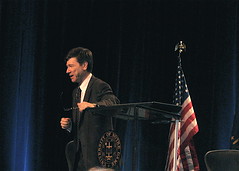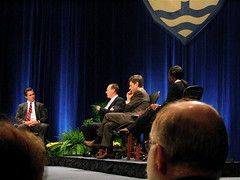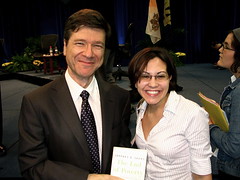Jeffrey Sachs at Notre Dame Forum 2006

Other speakers were Dr. Paul Farmer, a medical anthropologist whose work is centered in Haiti, and Dr. Miriam Opwonya, an AIDS researcher from Kampala, Uganda.
He's not just animated; he's angry. Because he knows that a lot of the crisis in the developing world can be avoided. Staring at people queuing up to die three to a bed, two on top and one underneath, in a hospital just outside of Lilongwe, Malawi, and knowing this doesn't have to be is too much for most of us. I am crushed. He is creative. He's an economist who can bring to life statistics that were, after all, lives in the first places. He can look up from the numbers and see faces through the spreadsheets, families like his own that stick together on treks to the far ends of the world. He helps us make sense of what senseless reallly means: fifteen thousand Africans dying each aned every day of preventable, treatable diseeases -- Aids, malaria, TB -- for lack of drugs that we take for granted.
This statistic alone makes a fool of the idea that many of us hold on to very tightly: the idea of equality. What is happening in Africa mocks our pieties, doubts our concern, and questions our commitment to that whole concept. Because if we're honest, there's no way we could conclude that such mass death day after day would ever be allowed to happen anywhere else. Certainly not in North America, or Europe, or Japan. An entire continent bursting into flames? Deep down, if we really accept that their lives -- African lives -- Are equal to ours, we would all be doing more to put the fire out. It's an uncomfortable truth.
In her forum introduction, moderator Gwen Ifill quoted the latter paragraph. The other panelists, particularly Dr. Farmer, continued to sing his praises throughout the discussions.
Professor Sachs began his talk by addressing the students in a manner one might imagine he addresses his own students at Harvard. He had good news and bad news for them. The good news was that these problems to be discussed today had practical solutions. The bad news, he said, "is that it's your homework." This he said with a sense of urgency, as if this would be the most important assignment these students would ever undertake.
He then showed us a photo of two children lying next to each other in malaria coma in Zambia. He called this an "unforgivable, unforgettable" scene, because malaria costs $2.86 to treat -- even less for a pediatric dose. He multiplied that by the amount of children who were contracting the disease, and then taking into account the massive amounts the U.S. is spending on the Military right now, and figured that it would cost just one day's worth of U.S. military expenses to get malaria under control. "Don't let anybody ever tell you we can't afford this," he said to thunderous applause.
He talked about his work with Millenium Villages, and laid out all of the practical steps to the economic transformation of a village in one year:
- Grow more food
- Control malaria
- Ensure access to clean drinking water
- Make sure all of the children get to go to school. A surefire technique, he said, was to "promise lunch, and they'll come." This solution harkens back to step #1
Throughout the Q&A session, Sachs would throw out various numbers and calculations to illustrate his points. "Math is my only specialty," he'd joke. But this is where his credibility lies. Numbers don't lie, my friends. That's why mathmaticians are the most honest people you'll ever meet. His book is jam-packed with graphs (most of which I just scratch my head at), and some are even in color. At one point the moderator asked the panelists about what they'd like to see the world be like in 2025. "They're not my wildest dreams," he replied. "they're my most practical calculations."
"Corruption," he said when asked of its challenges. "Is often the face of extreme poverty." The other two panelists agreed, with Dr. Farmer highlighting success with his program in Haiti "despite corruption and support for bad foreign policy." He pointed to Rotary's efforts to eradicate Polio, which has been reduced a thousand fold. "If Africa is so corrupted," he asked. "How did smallpox get eradicated when it required government functions to do it?"
My companion Jarett, however, is tres cooler than I, and also smarter. He went right up to Sachs and started asking him a well-formed question to which he got an interesting answer. I am going to ask him to make a guest entry here, detailing the exchange.
So stay tuned. In the meantime, you can view my photos of the event on flickr.
Labels: Matters of the Heart







1 Comments:
Wow, B that is so cool!!! He really is a hero in my book. And you looked great!!!
Check out my LJ, I got to talk to Bono yesterday at Nordies!
Post a Comment
<< Home